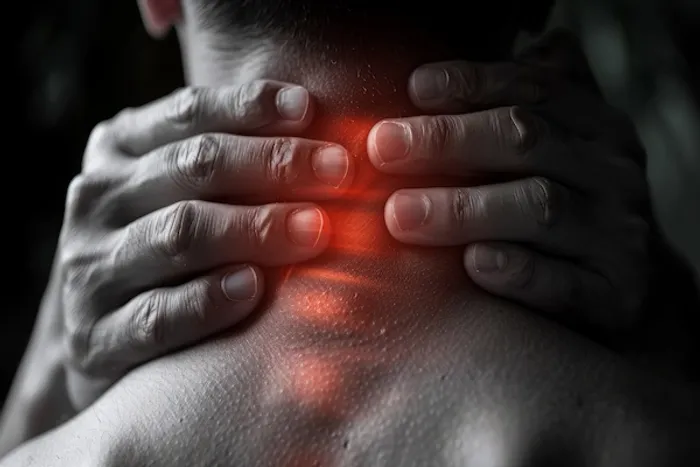Pinched Nerve in Neck: Non-Surgical Relief Guide
Learn how to relieve a pinched nerve in the neck with non-surgical methods, including exercises, posture tips, and effective home remedies.

Written by Dr. Shaik Abdul Kalam
Reviewed by Dr. J T Hema Pratima MBBS, Fellowship in Diabetes Mellitus
Last updated on 13th Jan, 2026

Introduction
That sharp, shooting pain radiating from your neck down your arm. The persistent numbness or tingling in your fingers. The frustrating weakness when you try to grip something. If this sounds familiar, you might be experiencing a pinched nerve in the neck, medically known as cervical radiculopathy. This common condition occurs when a nerve in your cervical spine is compressed or irritated, often by a herniated disc or a bone spur. While the pain can be debilitating, the good news is that the vast majority of people find significant relief through non-surgical treatment options. This comprehensive guide will walk you through everything you need to know, from identifying symptoms and understanding the causes to exploring a wide range of effective, conservative treatments you can try at home and with professionals. Our goal is to empower you with knowledge and practical strategies to alleviate your pain and reclaim your comfort.
What is a Pinched Nerve in the Neck (Cervical Radiculopathy)?
Understanding the condition is the first step to relief.
The Anatomy of the Problem
Your cervical spine consists of seven vertebrae (C1 to C7) stacked on top of each other. Between these vertebrae are flexible discs that act as shock absorbers. Nerve roots branch out from the spinal cord through spaces between the vertebrae and travel down into your shoulders, arms, and hands. Cervical radiculopathy occurs when one of these nerve roots becomes compressed or inflamed. This compression disrupts the nerve's normal function, leading to a variety of symptoms that are often felt far from the source of the problem, a phenomenon known as radiating pain. It's not the vertebrae themselves that are "pinched," but rather the delicate nerve that is being squeezed by surrounding structures.
Consult a Neurologist for the best advice
Recognising the Signs: Symptoms of a Pinched Nerve
The symptoms of a pinched nerve can vary depending on which specific nerve root is affected. However, they typically occur on one side of the body.
Pain: A sharp, burning, or aching pain that originates in the neck and travels along the path of the nerve down into the shoulder, arm, hand, or fingers.
Numbness or Reduced Sensation: A feeling of "pins and needles" or loss of feeling in the arm or hand, similar to when your foot falls asleep.
Tingling (Paresthesia): A prickling or buzzing sensation in the affected areas.
Muscle Weakness: Weakness in the shoulder, arm, or hand, making it difficult to grip objects, lift your arm, or perform fine motor tasks.
Where Does it Hurt? Understanding Radiating Pain
The location of your symptoms can often indicate which cervical nerve is involved. For example, compression of the C6 nerve root often causes pain and numbness that radiates down the thumb side of the arm into the thumb and index finger. Compression at C7, the most common level, affects the middle finger, while C8 affects the ring and pinky fingers. This map of pain helps doctors pinpoint the source of the problem.
Common Culprits: What Causes Cervical Radiculopathy?
Identifying the root causes can help prevent and manage symptoms.
Degenerative Changes: The Most Common Cause
As we age, our spines naturally undergo wear and tear, a condition known as degenerative disc disease. This can lead to:
Herniated Disc: The soft, gel-like center of a spinal disc pushes through a tear in the tougher exterior, pressing on the adjacent nerve root.
Bone Spurs (Osteophytes): The body may produce extra bone in an attempt to strengthen the spine. These bony growths can narrow the spaces where nerves exit and compress them.
Acute Injuries and Other Risk Factors
While degeneration is the leading cause, acute events can also be to blame. A sudden injury from a car accident (whiplash), a sports impact, or heavy lifting can cause a disc to herniate abruptly. Risk factors include having a job requiring repetitive neck motion, a history of neck injuries, genetics, and smoking, which can accelerate disc degeneration.
Getting a Proper Diagnosis: It’s Not Just a Stiff Neck
Self-diagnosing a pinched nerve can be risky, as other conditions can mimic its symptoms. A professional diagnosis is crucial.
The Physical Exam and Medical History
A doctor will begin by discussing your symptoms and medical history. They will then perform a physical exam, checking your neck's range of motion, muscle strength, reflexes, and sensation. They may ask you to perform specific movements to see which ones reproduce or relieve your pain.
Imaging Tests: X-Rays, MRIs, and EMGs
X-rays: Can show the alignment of your bones and the presence of bone spurs.
MRI (Magnetic Resonance Imaging): This is the gold standard for visualizing soft tissues like discs, nerves, and ligaments. It can clearly show a herniated disc or nerve compression.
EMG (Electromyography): This test measures the electrical activity in your muscles and can determine if nerve damage is present and how severe it is.
If your symptoms persist beyond two weeks or are severe, consult a doctor online with Apollo24|7 for further evaluation and to discuss imaging options.
The First Line of Defense: Immediate At-Home Remedies
For mild cases, starting with conservative at-home treatments can be very effective.
The RICE Method: Rest, Ice, Compression, Elevation
Rest: Avoid activities that aggravate your pain, especially those involving heavy lifting, twisting, or repetitive neck movements. However, complete bed rest is not recommended, as gentle movement is important for recovery.
Ice: Apply an ice pack to the painful area in your neck for 15-20 minutes every 2-3 hours for the first 48 hours to reduce inflammation.
Compression: Not typically used for the neck.
Elevation: Not applicable.
Heat Therapy: When to Use a Warm Compress
After the first 48-72 hours, switching to a heating pad or warm shower can help relax tense muscles and improve blood flow to the area, promoting healing.
Over-the-Counter Pain Relievers
Nonsteroidal anti-inflammatory drugs (NSAIDs) like ibuprofen or naproxen can help reduce inflammation and alleviate pain. Always follow the dosage instructions and consult a doctor if you have any underlying health conditions.
Professional Non-Surgical Treatments for Lasting Relief
If home care isn't enough, a doctor or physical therapist can guide you through more structured treatments.
Physical Therapy: The Cornerstone of Recovery
A physical therapist will design a personalised program to address your specific issue. This is one of the most effective non-surgical treatments.
Manual Therapy: Hands-on techniques to mobilise stiff joints and soft tissues.
Therapeutic Exercises: Strengthening exercises for the neck, shoulder, and upper back muscles to provide better support for the spine.
Traction: Gentle stretching of the neck to create more space between the vertebrae and relieve pressure on the nerve.
Key PT Exercises: Chin Tucks, Neck stretches, Scapular Squeezes
Chin Tucks: Sit or stand upright. Gently pull your chin straight back, creating a "double chin." Hold for 5 seconds. This strengthens deep neck flexors.
Scapular Squeezes: Sit upright and gently squeeze your shoulder blades together, holding for 5-10 seconds. This improves posture.
Medications for Pain and Inflammation
If OTC options are insufficient, a doctor may prescribe:
Oral Corticosteroids: A short-term course of strong anti-inflammatory medicine like prednisone.
Muscle Relaxants: To relieve muscle spasms often associated with a pinched nerve.
Neuropathic Pain Medications: Drugs like gabapentin or pregabalin can help calm irritated nerve signals.
Advanced Interventions: Cervical Epidural Steroid Injections
For severe, persistent pain, an injection of corticosteroid directly into the space around the inflamed nerve root can provide powerful, targeted relief. This isn't a cure but can break the cycle of pain and inflammation, allowing you to participate more effectively in physical therapy.
Lifestyle Modifications and Prevention Strategies
Preventing recurrence is key to long-term neck health.
Ergonomic Adjustments for Your Workspace
Set up your desk so your computer monitor is at eye level. Use a chair with good lumbar support and keep your feet flat on the floor. This prevents constant forward head posture, a major contributor to neck strain.
Posture Correction Techniques
Be mindful of your posture throughout the day. Avoid slouching and texting with your head down ("text neck"). Regularly check in with your body alignment.
Sleep Positions to Support Your Neck
The best sleeping position for a pinched nerve is on your back or side. Avoid stomach sleeping, which twists the neck. Use a supportive pillow that keeps your neck aligned with the rest of your spine.
When to Seek Professional Help: Warning Signs
While many cases can be managed at home, certain "red flag" symptoms require immediate medical attention:
Progressive neurological symptoms (worsening numbness or weakness).
Pain or symptoms in both arms or legs.
Loss of balance or coordination.
Loss of bladder or bowel control (cauda equina syndrome).
Severe, unrelenting pain that doesn't improve with rest.
Conclusion: Taking Control of Your Neck Health
Dealing with a pinched nerve in the neck can be a painful and frustrating experience, but it's important to remember that you have many powerful tools at your disposal. From simple at-home remedies and targeted exercises to advanced pain management techniques, a non-surgical path to recovery is not only possible but highly probable. The journey involves patience, consistency with your exercises, and a commitment to improving your daily habits. By understanding the causes, listening to your body, and seeking professional guidance when needed, you can effectively manage your symptoms, prevent future flare-ups, and get back to living your life without pain. Take the first step today by assessing your workspace or trying a gentle chin tuck.
Consult a Neurologist for the best advice
Consult a Neurologist for the best advice

Dr Debnath Dwaipayan
Neurosurgeon
9 Years • MBBS, MS(Gen. Surgery), DrNB (Neurosurgery)
Delhi
Apollo Hospitals Indraprastha, Delhi

Dr. Uddalak Chakraborty
Neurologist
8 Years • MBBS,MD(GENL. MED.),DM(NEUROLOGY)
Kolkata
VDC Clinic, Kolkata
(25+ Patients)

Dr. Uddalak Chakraborty
Neurologist
8 Years • MBBS, MD(GENL.MED.),DM(NEUROLOGY)
Kolkata
MCR SUPER SPECIALITY POLY CLINIC & PATHOLOGY, Kolkata

Dr. Ganeshgouda Majigoudra
Neurologist
10 Years • MBBS, MD ( GENERAL MEDICINE) DM (NEUROLOGY)
Bengaluru
Apollo Clinic, JP nagar, Bengaluru

Dr. Dhruv Zutshi
Neurologist
17 Years • MBBS, MD - General Medicine, DM - Neurology
Delhi
Apollo Clinic East Of Kailash, Delhi
Frequently Asked Questions
1. How long does it take for a pinched nerve in the neck to heal?
Most people experience significant improvement within a few weeks to a few months with consistent conservative treatment. The exact timeline depends on the severity of the nerve compression and how diligently you follow your treatment plan.
2. What exercises should I avoid with cervical radiculopathy?
Avoid high-impact activities, heavy overhead lifting, and exercises that involve jarring motions or extreme neck flexion/extension (e.g., sit-ups, bridges, contact sports) until your symptoms have substantially improved and a healthcare professional clears you.
3. Is cervical traction effective for a pinched nerve?
Yes, cervical traction can be very effective. It works by gently stretching the neck joints, creating space between the vertebrae, which can relieve pressure on the pinched nerve and reduce pain. It should be performed under the guidance of a physical therapist.
4. Can a pinched nerve in the neck cause headaches?
Absolutely. A pinched nerve or muscle tension in the upper cervical spine (C1-C3) is a common cause of cervicogenic headaches, which are felt in the back of the head and can radiate to the forehead and temples.
5. What is the difference between a pinched nerve and a muscle strain in the neck?
A muscle strain typically causes localized pain, stiffness, and muscle spasms in the neck itself. A pinched nerve (cervical radiculopathy) causes symptoms that radiate away from the neck, such as shooting pain, numbness, tingling, or weakness in the shoulder, arm, or hand.